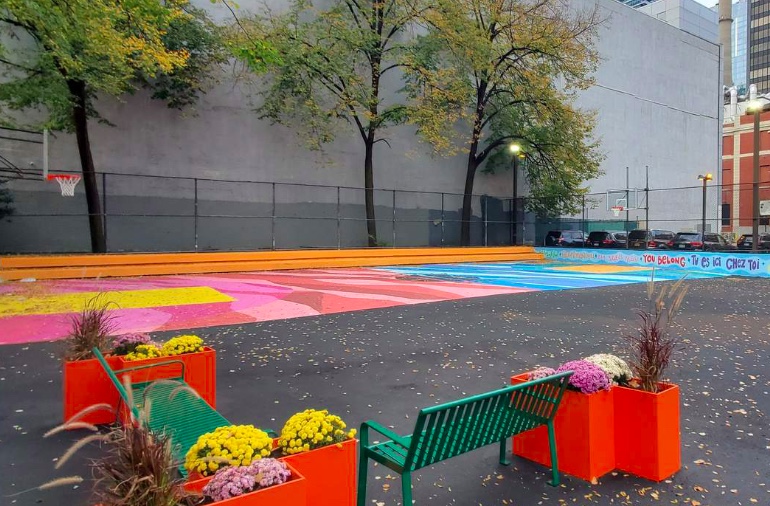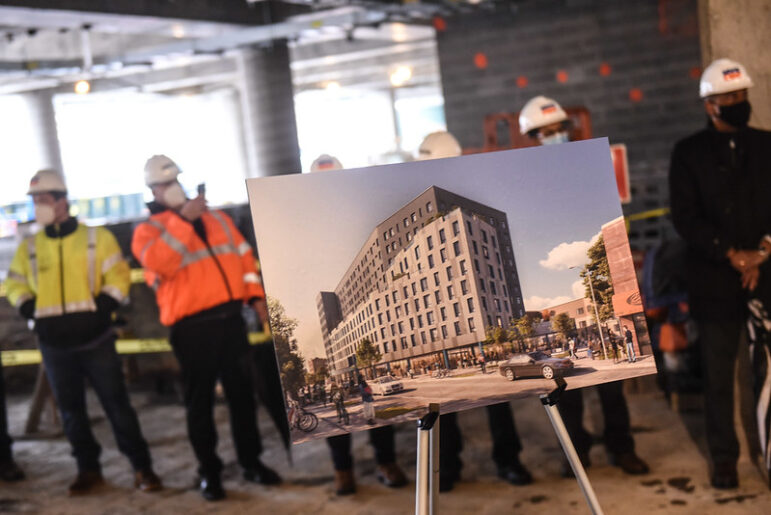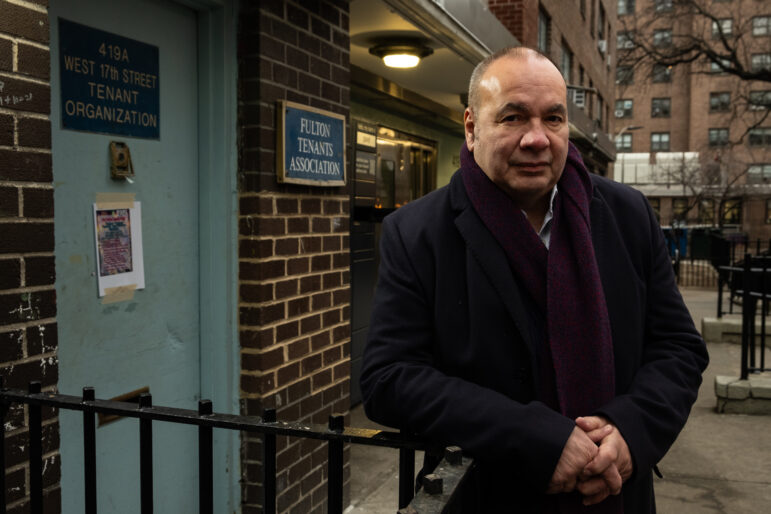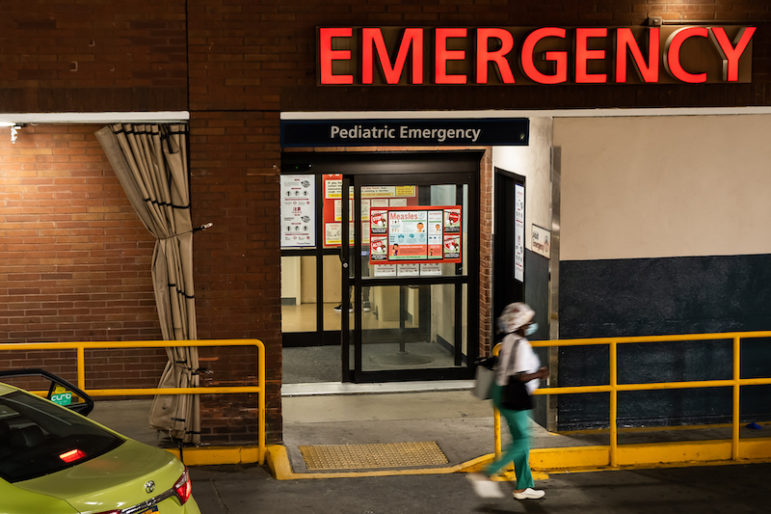In the Far Rockaway neighborhood of Queens on a slate gray Friday in February, the food pantry at St. Gertrude the Great was devoid of clients. The woman working there, who wanted to be identified only as Marbe, explained why.
“There’s nobody today because it’s the beginning of the month,” she said. People had just received their unemployment checks and food stamp benefits. “By the middle of the month, there’ll be more.”
Marbe began working at the pantry in 2000 and says she saw demand spike in 2001, only to subside as more pantries opened up in the area. Recently it has picked up again. A year or so ago, she says, clients used to make excuses. “I’m only here because I lost my job,” and such. But now so many people are out of work or living on lower pay from reduced hours that there is no embarrassment. The clients know, Marbe says, that “it’s nothing to be ashamed of.”
The impact from the current, staggering levels of black unemployment across the five boroughs is only beginning to register and will most likely be felt for years. Byt decades if joblessness have already left an imprint. Clearly, the most obvious impact has been— and will be—increased black poverty.
Most poor families have no one working full-time. Most families living just above the federal poverty line do. So work is no guarantee that a family will live comfortably. But work might be the difference between living in poverty or living above—slightly, but nonetheless above—poverty.
The disparity between black and white joblessness is mirrored in the city’s poverty numbers: A black poverty rate of 21 percent compared with a white rate of 14 percent in 2008. That gap will grow thanks to today’s joblessness. The Economic Policy Institute predicts that if current economic trends are not arrested, the poverty rate nationwide for black children could jump from one-third to nearly one-half.
But the effects of joblessness do not stop with the reduction in current income. Estimates are that losing a job in a recession lowers a person’s lifetime earnings 10 to 25 percent—an especially painful blow to blacks, who make less than whites at every skill level anyway. (According to a recent study by the Center for an Urban Future and the Community Service Society, white men in New York City without a high school diploma make an average of $12.47 an hour. Latinos without a diploma get $11.69. Black men get $10.)
Losing a job means losing income, and that has health consequences. A lot of research points to poor people living sicker and dying sooner than the better off. The math can be pretty stark: One 2009 paper by researchers from the Federal Reserve Bank of Chicago and Columbia University suggests that for some workers, losing a job can increase the risk of death by 20 percent over 20 years.
It’s easy to guess at ways that less money translates into shorter lives: more stress, a greater vulnerability to violence, poor nutrition. Pantries like St. Gertrude the Great’s try to close the gap between what people need to eat and what they can afford. According to the Food Bank for New York City, 93 percent of pantries around the city saw an increase in first-time visitors in 2009. Food stamp usage in New York also reflects the growing need for help.
The foreclosure crisis is now being fed by people losing jobs—in some cases, still working one job but losing the second job they’d picked up to cover their mortgage payments. According to the Institute for Children and Poverty, more than half of family heads who are homeless in the city are unemployed, and 18 percent have never held a job. The number of black people in New York City’s homeless shelter system increased 38 percent over the past six years. Blacks are now the majority in the shelters.
For some jobless men, homelessness is a cause as much as an effect of joblessness. Jonathan Sawyer, who is 24 and originally from Brooklyn but living on the Upper West Side, attended the Bronx High School of Science and earned a Regents diploma. He did poorly in his first semester at college—he says he was distracted by financial problems caused by his mother’s failure to pay tuition—and was expelled in 2006. Then his father kicked him out of the house. He hasn’t worked much since; a seasonal job at Shea Stadium evaporated because of an alleged discrepancy in the register on his second day. He has bounced from the streets to shelters, and he attributes his poor employment record to this instability. “I think for me as an individual, it’s been because of my housing situation,” he says. “It’s kind of hard to focus on contacting employers when you don’t have a place to stay.”
One of the features of the joblessness problem is that it tends to feed on itself, as it has in Sawyer’s case. And the impact isn’t confined to this generation. Research indicates that a child whose parent loses a job is more likely to repeat a grade. (Teens are already feeling today’s crisis. Unemployment nationwide among 16 to 19 year olds hit 25 percent in February, up 63 percent over its 2006 level. Among black teens, the rate was up 42 percent.) Studies also suggest that adults whose fathers lost jobs have lifetime earnings that are 9 percent lower than adults whose dads maintained employment. More startling than the disparity between white and black incomes is the gap between white and black wealth. As important as income is, wealth is the real measure of economic security and progress. Wealth allows a family to send the kids to college, invest in the stock market or start a business. It provides a cushion against future financial misfortune. But it also reflects the world that one’s parents and grandparents lived in.
“Unlike income, wealth directly transfers from one generation to the next. You’re looking at all the injustices of previous generations carried forward with interest,” says Brian Miller, executive director at United for a Fair Economy, a Boston-based economic justice advocacy group. In 2007 the median net worth of non-white families was a stunningly low 17 cents to every dollar of the median white family’s wealth. “If anything,” Miller says, “the drop in the housing market may have widened that gap.”
Joblessness will stretch it even wider. Jobless blacks with wealth will probably have to tap into it to support themselves. Black entrepreneurs with black clienteles will see wealth dwindle because customers can’t afford to spend as much. But even blacks who don’t lose a job or see their business suffer will watch their wealth disappear because they are more likely than whites to have relatives who lose their job and need help. One recent study found that 27 percent of the difference between white and black wealth could be explained by differences in their kin networks, like the incidence of poverty in their families. “Middle-class blacks have higher burdens in terms of relatives who are in poverty, or higher pressures to support relatives who are unemployed, compared to their white counterparts,” says Darrick Hamilton, one of the authors of that study. “I think the recession further exacerbates that, so we will get an even further reduction in black wealth, especially in light of [welfare reform].” In other words, black families with means are supporting people that the government used to help. This impact of black-male joblessness on the larger black social structure is perhaps the gravest concern. Says the NAACP’s Washington bureau director, Hilary Shelton: “This is one of the things that affect the very fabric of our family.” Social scientists have long suspected that joblessness has weakened the black family, because rising levels of unemployment appeared at the same time as increasing numbers of singlemother households and births out of wedlock.
The correlation can be understood crudely as a matter of supply and demand. Men are the supply side in two markets: the market for male labor and the market for husbands. How they do in one market can affect how they fare in the other. In the marriage market, to the extent that men are differentiable products (and many women might doubt that), employment is one of the big differentiators. A guy who has a good job has a leg up on a guy who doesn’t, and a man with any job probably has an advantage over a man who is out of work, especially one who has never worked. A man who doesn’t bring a paycheck home simply doesn’t have much to offer.
Theoretically, jobless black men could stay home and take care of the kids. But all indications are, that happens very rarely for men of any color. So that leaves jobless men with no meaningful role in the family, meaning that an increasing number of black men could be seen as having no contribution to make. As that becomes more common, says Jones, “there are real social dangers.”
One social danger often associated with unemployment is crime. Last year, New York’s crime rate fell despite the recession, leading some to conclude that the NYPD has broken the link between economic desperation and criminal conduct.
But now, amid news stories about precinct commanders feeling pressure to downgrade crimes, there are doubts about the veracity of the crime statistics of past years. So far this year, there are increases in murders, rapes, felony assaults and burglaries.
Plus, the official crime stats measure only offenses that the NYPD has classified as fitting one of seven major felony categories. Most crimes— including all drug sale and possession crimes—fall outside those categories, and those crimes appear to have trended upward as the economy has soured. From 2006 to 2009, the number of arrests in the city increased 12 percent. Felony collars fell, but misdemeanor busts swelled 18 percent.
Brett Epps knows something about crime and punishment. A 52-year-old encountered by City Limits during one of his breaks from a treatment program in Far Rockaway in February, Epps spent 23 years, 5 months, 10 days in prison for attempted murder. He had been out of work since September.
“I had a friend of mine, he owns seven dry cleaners, offered me a job managing one of them,” he said. “I had to quit because the chemicals were making me sick.” Many of the people he knows are out of work, and most of them have lost their jobs in the past three months. “One of them, his father’s taking care of him. The others are on food stamps or they’re on public assistance,” he said. No one he knows has turned to crime, he added.
But the informal economy doesn’t necessarily mean selling drugs or robbing people for money. As Epps spoke, a man walked briskly by muttering, “Loosies … Newports … loosies.”
The recent surge in black joblessness will leave its mark not just on workers, families and neighborhoods, but on history, too. In the sweep of the black American experience, recessions have triggered huge setbacks in the long-term push for basic economic equality. After the recessions of the mid-1970s and early 1980s, “the impact on employment was so severe that it stopped the progress toward wage equality,” says Mason. “If you look at wage movements from the mid-’60s to early ’70s, there was a lot of progress made, so much so that a very famous economist at the time, Richard Freeman, wrote about the collapse in discrimination,” he adds. “In the early 1990s, he wrote another paper: ‘What Went Wrong?'”
Individual black men, of course, can’t always worry about their place in the sweep of history. For them, the impact of the recession is personal, and painful. John Tyus fared well in the job market during the early part of his life. Now 46, he was a stockbroker until 2007, when he quit to start a business. It failed, and he’s been looking for work since. “It’s just taking a lot longer to find something than I ever anticipated. I thought I had skills that would translate,” Tyus says. “I’ve interviewed for countless positions during that time period.”
“The net result is all the plans you had where you were creating the future or this idea of what the future would be are put on hold. You wind up with ways of making do. You aren’t actually making progress,” he says. “If you wanted to send your kids to school— maybe you were thinking of private school—that’s out.” “I interview four or five times a week, and either you’re too qualified or they’ll ‘think about it.’ It’s a very hurtful thing for a person 15 or 20 years younger than you to tell you you don’t have experience. It’s a little frustrating.”








